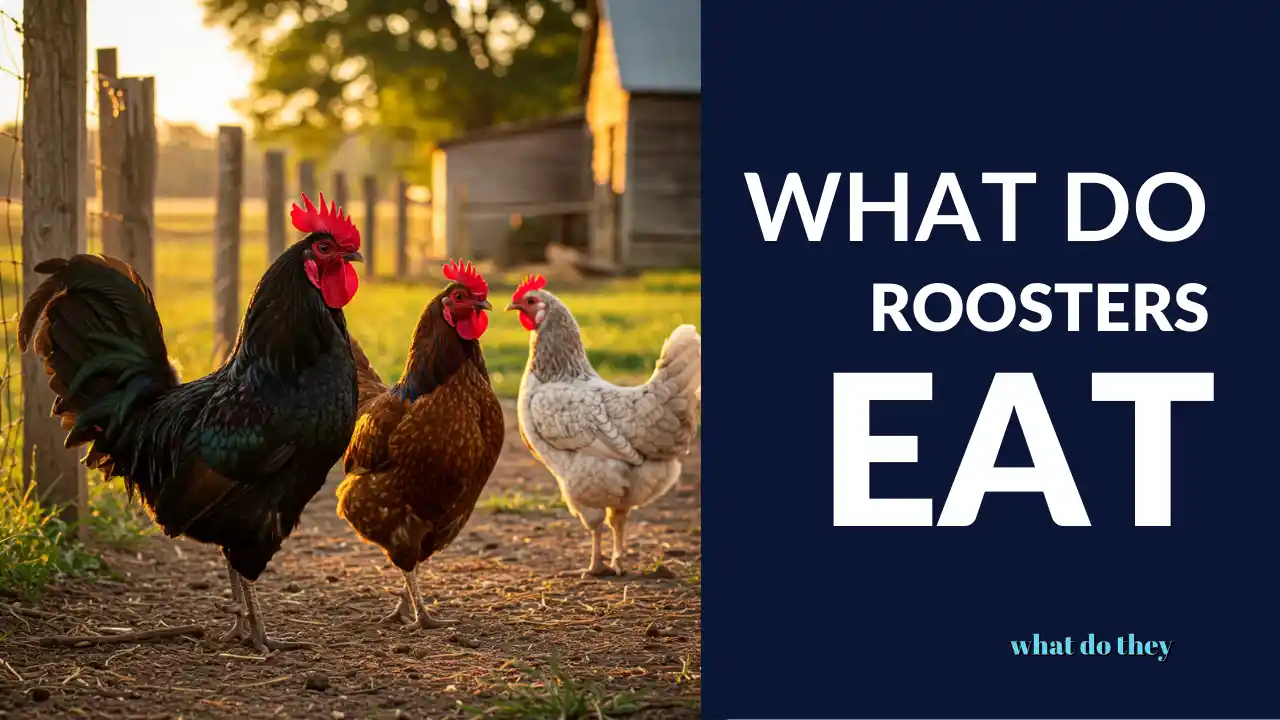If you have chickens or are thinking about adding some to your backyard flock, you might be wondering about the specific dietary needs of roosters. While roosters are male chickens, their nutritional requirements can differ slightly from hens. So, what do roosters eat? If you love to read about what different animals and insects eat, take a look at the following:
So, What Do They has prepared this blog so you’ll learn the answer to the question: What do Roosters Eat? Let’s explore the best feeding practices to keep your rooster happy.
The Natural Diet of Roosters

In the wild or when free-ranging, roosters are natural foragers. They spend hours scratching and pecking at the ground in search of food. What do roosters eat when allowed to forage naturally? Their diet typically includes:
Insects and Small Creatures
- Worms
- Beetles
- Grasshoppers
- Crickets
- Grubs
- Small lizards
- Mice (occasionally)
Plants and Seeds
- Grass and weeds
- Seeds from various plants
- Berries
- Fruit fallen from trees
- Flower petals
- Tender shoots and leaves
This varied diet provides roosters with a good balance of protein, carbohydrates, vitamins, and minerals. Roosters are particularly good at finding protein sources, which they need for muscle maintenance and overall health.
Commercial Feed for Roosters
Most backyard roosters don’t rely entirely on foraging. They need supplemental feed, especially if they don’t have access to large areas for finding natural foods. What do roosters eat in terms of commercial feed?
Layer Feed vs. Grower Feed
Unlike hens that produce eggs and need higher calcium, roosters don’t require as much calcium in their diet. However, since most people keep roosters with hens, roosters often eat layer feed by default.
- Layer feed: Contains 16-18% protein and added calcium
- Grower feed: Contains 15-17% protein without extra calcium
- All-flock feed: A good compromise at 16% protein with moderate calcium
If you keep only roosters, a grower or all-flock feed is usually the better choice. Too much calcium can potentially lead to kidney problems in roosters over time.
Protein Requirements
What do roosters eat that’s high in protein? Roosters generally need slightly more protein than hens, especially if they’re active and serving as flock protectors. Young roosters who are still growing need even more protein—around 18-20%.
Good protein sources include:
- Commercial feed with appropriate protein levels
- Mealworms (dried or live)
- Black oil sunflower seeds
- Cooked eggs
- Legumes like peas
Supplemental Foods for Roosters

Beyond commercial feed, you can offer roosters a variety of supplemental foods. What do roosters eat as treats and supplements?
Grains
- Cracked corn (in moderation)
- Oats
- Wheat
- Barley
Fruits (in moderation)
- Berries
- Melon pieces
- Apple chunks (no seeds)
- Banana
- Grapes (cut in half)
Vegetables
- Leafy greens (lettuce, kale, spinach)
- Cucumber
- Zucchini
- Carrots (shredded)
- Pumpkin
- Sweet potato (cooked)
Other Healthy Treats
- Plain yogurt (small amounts)
- Cooked rice
- Pasta (plain, cooked)
- Scrambled eggs
Foods to Avoid
While knowing what do roosters eat is important, it’s equally important to know what not to feed them:
Never Feed Roosters:
- Avocado (toxic to chickens)
- Chocolate
- Raw potato skins
- Dry or undercooked beans
- Moldy or spoiled food
- Salty foods
- Onions in large amounts
- Citrus fruits (in large quantities)
- Processed human foods
- Any food with artificial sweeteners
Seasonal Changes in Rooster Diet

What do roosters eat may change slightly with the seasons:
Winter Feeding
During cold months when natural forage is limited:
- Increase corn in the evening (helps generate body heat)
- Provide more protein to maintain energy
- Consider warm mash in the morning
- Make sure feed doesn’t freeze
Summer Feeding
During hot months:
- Increase access to fresh greens
- Provide more watery fruits and vegetables
- Feed early morning and late evening when cooler
- Make sure clean water is always available
Special Considerations for Roosters
Young Roosters (Cockerels)
What do roosters eat when they’re young and growing? Cockerels need:
- Higher protein feed (18-20%)
- More frequent feeding
- Proper nutrition for bone and muscle development
Show Roosters
If you’re raising roosters for showing:
- Add black oil sunflower seeds for feather quality
- Consider adding poultry conditioning supplements
- Provide additional protein for muscle definition
- Ensure they get enough vitamins A and E for feather health
Aging Roosters
Older roosters may benefit from:
- Easier-to-digest foods
- Added supplements for joint health
- Slightly lower protein to reduce strain on kidneys
- More finely ground feed if they have beak issues
Feeding Schedule and Amounts
What do roosters eat in terms of quantity? An average adult rooster consumes about 5-7 ounces (140-200 grams) of feed daily, but this varies based on:
- Size and breed
- Activity level
- Weather conditions
- Access to forage
- Age
Most chicken keepers feed their flocks twice daily:
- Morning feeding: About 1/3 of daily intake
- Evening feeding: About 2/3 of daily intake
Some prefer free-choice feeding with feeders that are always filled, while others prefer scheduled feeding times.
Water Requirements
Although we’re focusing on what do roosters eat, proper hydration is just as important as food. Roosters need constant access to clean, fresh water. They drink more water than you might expect—about 1 pint to 1 quart daily depending on size and weather conditions.
In winter, use heated waterers to prevent freezing. In summer, place waterers in shaded areas to keep water cool.
So the Answer to What do Roosters Eat is…
A healthy rooster diet includes quality commercial feed appropriate for their age and needs, supplemented with foraged insects and plants when possible, and occasional treats for variety. The ideal diet balances protein, carbohydrates, fats, vitamins, and minerals, with slightly different needs than laying hens.
Whether you keep roosters for flock protection, breeding, showing, or simply as part of your backyard chicken family, understanding their nutritional needs will help ensure they remain healthy, vibrant, and able to perform their natural behaviors. A well-fed rooster rewards you with beautiful plumage, strong crowing, and excellent protection for your flock of hens.
Remember that each rooster is an individual with unique preferences. Pay attention to what your rooster seems to enjoy and what keeps him in top condition. With proper nutrition and care, roosters can live 5-8 years or even longer, serving as the magnificent and protective guardians of your chicken flock.








Leave a Comment